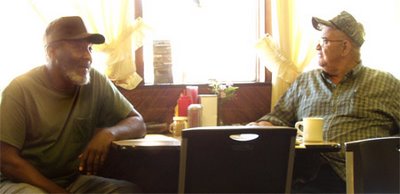
I took a seat in our local cafe the other day across from these gentlemen, one black, one white. I snapped a picture while they were deep in conversation. And just for a moment I thought, this is holy ground, the kind of place Jesus would hang out...nuetral ground at the cross roads of culture and although there is a kind of informal protocol, it's without pretense or agenda. How many places like this exist in our communities, do we know whre they are?
Ray Oldenburg, in his book Celebrating the Third Place: Inspiring Stories About the "Great Good Places" at the Heart of Our Communities, explores the contribution of cafes like this. I found one comment on the book interesting:
"Dr. Oldenburg helped me to understand that when good citizens of a community find places to spend pleasurable hours with one another for no specific or obvious purpose, there is purpose to such association. One of these places is, of course, our cafe environment. We provide an informal public gathering place which is not and can not be supplied by any other agency in the society."

Oldenburg positions "third places" beside home and work. I wonder... Knowing that the church is people (we have to keep reminding ourselves), what would have to change to make the church qualify as a third place? How could we create these wonderful, highly-engaging 'front porches' in our community?


